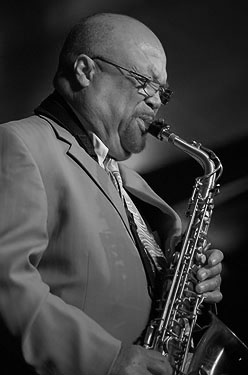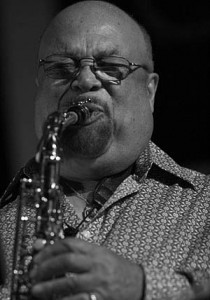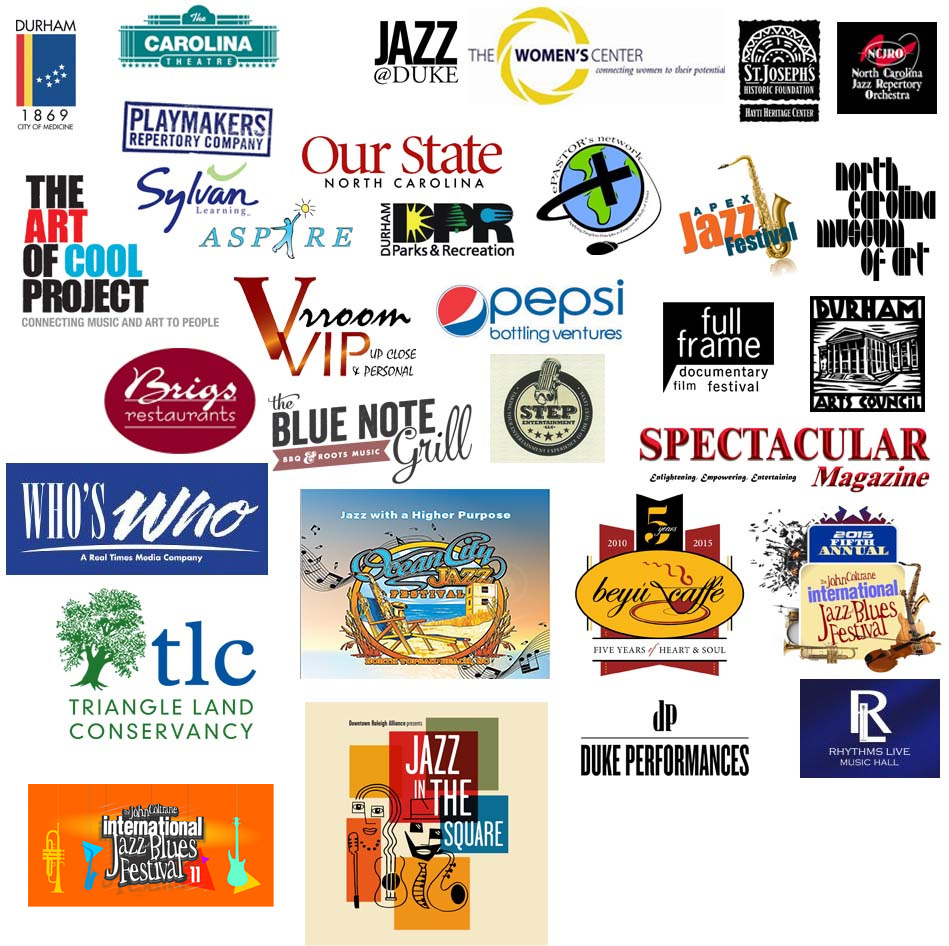Meet Artist and NCCU Alumnus Ivey Hayes on Friday, March 9, 10:30 a.m. in the NCCU Art Museum.
Archive for March, 2012Meet Artist and NCCU Alumnus Ivey HayesThursday, March 8th, 2012Spring Fest 2012Friday, March 2nd, 2012April 11 – 20 Keeping the Signal Alive Update Volunteers Needed Let’s Talk WNCU! Your contribution is tax-deductible to the full extent allowed by law. Please allow approximately eight weeks upon receipt of your payment for delivery of your thank you gift. For membership inquires call 919-530-7759. Mail this pledge form with check, money order or credit card information to: James “Red” HollowayThursday, March 1st, 2012
During grade school, Red played banjo and harmonica in school bands. His first musical instrument, a tenor sax, was given to him by his stepfather when he was twelve years old. During high school, he was in the DuSable big band, where Eugene Wright Big Band Photohe sat next to fellow classmate and reedman Johnny Griffin. At sixteen and while still in school, he was hired for his first professional engagement by bassist Gene Wright, who later went on to become a member of the Dave Brubeck Quartet. Red played with Wright’s Big Band for three years at the Parkway Ballroom. When Red was nineteen, he joined the Army, where he became bandmaster for the U.S. Fifth Army Band. After completing his military service, Red returned to Chicago and played with Yusef Lateef and Dexter Gordon, among others. In 1948 he was asked by blues vocalist Roosevelt Sykes to join Sykes’ U.S. Road Tour. During this time, other bluesmen heard him and subsequently hired him, including Nat “Lotsa Poppa” Towles, Willie Dixon, Junior Parker, Bobby “Blue” Bland, Lloyd Price, John Mayall, and B.B. King. Because of these associations, Red became typecast, perhaps unfairly, as primarily a blues player. During the Fifties, Red continued playing in the Chicago area with such notables as Billie Holiday, Muddy Waters, Chuck Berry, Ben Webster, Jimmy Rushing, Arthur Prysock, Dakota Station, Eddie “Cleanhead” Vinson, Wardell Gray, Sonny Rollins, Red Rodney, Lester Young, Joe Williams, Redd Foxx, Aretha Franklin,a nd many others. During this same period, he also played road tours with Danny Overbee, Sonny Stitt, Memphis Slim, Lefty Bates, and Lionel Hampton. The public finally became aware of Red In 1967 Red movedto Los Angeles and in 1969 became the coordinator of talent and member of the house band at the famed Parisian Room. This association lasted for the next fifteen years and saw Red hire virtually everyone who was anyone in the world of jazz and blues. Red quit as talent coordinator for the Parisian Room after his request for a cost-of-living raise was denied. The club closed eight months later. During Red’s tenure at the Parisian Room, he took occasional breaks for European, South American, and Japanese tours. From 1977 to 1982, he and altoist Sonny Stitt became a duo and cut two recordsRed in Europe on Catalyst: Forecast; Partners – Sonny and Red. In fact, it was Sonny who encouraged Red to take upthe alto saxophone, believing that anyone who could also play clarinet, flute, piccolo, piano, bass, drums, and violin could probably master yet another instrument. Sonny was right, and Red is equally proficient on both tenor and alto. In The Encyclopedia of Jazz in the Seventies, Leonard Feather wrote that “Holloway is capable of generating great excitement with his big sound and hard-driving, mainstream-modern style.” Since Stitt’s untimely death in 1982, Red has spent most of his time touring the States and Europe, either as a single or with his own band. He is now in partnership with trumpeter Clark Terry, with whom he has recorded on both Concord and Delox. This biography was originally published at www.redholloway.com. |


 James W “Red” Holloway was born in Helena, Arkansas on May 31, 1927 to a mother who played piano and a father who played violin. At the age of five, he and his mother moved to Chicago, where he graduated from DuSable High School and attended the Conservatory of Music.
James W “Red” Holloway was born in Helena, Arkansas on May 31, 1927 to a mother who played piano and a father who played violin. At the age of five, he and his mother moved to Chicago, where he graduated from DuSable High School and attended the Conservatory of Music. during the Sixties as a result of his association with organist “Brother” Jack McDuff. Another member of this band was guitarist George Benson. The band was together from 1963 to 1966City of LA Award and performed road tours in the States as well as concerts in Europe. Red recorded several albums with McDuff on Prestige, including the hit single Rock Candy.
during the Sixties as a result of his association with organist “Brother” Jack McDuff. Another member of this band was guitarist George Benson. The band was together from 1963 to 1966City of LA Award and performed road tours in the States as well as concerts in Europe. Red recorded several albums with McDuff on Prestige, including the hit single Rock Candy.